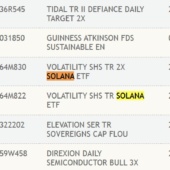Jason Lowery, US Space Force Major and author, believes Bitcoin is a far-from-conservative technology transforming physical energy into secure digital power by taking “watts to secure cyberspace” rather than logic encoded. For Lowery, the Bitcoin network provides a different perspective on protecting everything from software instructions to sophisticated data structures associated with digital assets and intelligence.
His vision of Bitcoin to enhance national defense had put him in the spotlight, especially after the recent political changes. Since Trump’s victory, there has been even more speculation on possible policy changes that could impact the US economy and national strategy supporting digital assets.
US Space Force Major Calls for Bitcoin-Centric National Defense Policy
US Space Force Major and author of Software Jason Lowery called upon the United States to reconsider Bitcoin’s strategic relevance with a proposed Bitcoin National Defense policy. For Lowery, below, Bitcoin is a strategic asset in national defense, as it utilizes physical power to secure cyberspace and thus is much more than a simple financial asset.
Bitcoin represents people digitizing physical power (turning watts into bits) and using physical power (watts) to secure cyberspace, as opposed to relying exclusively on encoded logic. This network can be used to secure any kind of information, command signals, software, or…
— Jason Lowery (@JasonPLowery) November 7, 2024
Last year, Lowery shared a diagram illustrating how Bitcoin could change the current system, which he refers to as a system in which the chain of custody regarding assets like land, gold, oil, and equities is based on force. He argued that not having to take anyone’s life to protect monetized wealth makes the energy usage by Bitcoin well worth it.
Bitcoin, a Key to Cyber Sovereignty
Lowery believes that through the physical security of information and digital assets in a non-trusting, peer-to-peer manner, Bitcoin’s Proof-of-Work mechanism realized cyber sovereignty akin to land, sea, air, and space domains that nations are built upon. Bitcoin was a revolutionary breakthrough in computer science, which he felt was highly undervalued.
He criticized the Department of Defense’s lack of initiative, pointing out that he found it unacceptable to believe the agency had not done more to explore and research the cybersecurity benefits of reusable Proof-of-Work networks like Bitcoin. He argued that the United States should lead this area now and proactively fund research relevant to these types of networks.
US Space force Major Lowery added that the policymakers need better advice on differentiating Bitcoin from other blockchain technologies since Lowery believes that understanding such key differences represents the first step toward creating successful national strategies.
Can Bitcoin Secure America’s Future?
It’s not sure what he thinks about new Lummis’ proposition on US strategic Bitcoin reserves. However, he stated that whatever planned US Bitcoin reserves would fall far short of what national security needs. The reason is that the moment Bitcoin became perceived as analogous to “biopower, it would be insufficient to secure the nation’s interests by holding only a million units.
To ensure access to Bitcoin and further strengthen blockchain security, Lowery advocated creating a robust hashing industry that he called a “US Hash Force.” He said this could be an industry – led effort, adding that the government could lend its support to accelerate it. Just as the US Space Force is supporting commercial launch companies to ensure dependable access to orbit, he said, a similar model could ensure access to the Bitcoin ledger.


In his thesis, Lowery called Bitcoin “the most powerful and efficient non-kinetic power projection tool which humanity has found so far, termed it a “Mutually Assured Preservation” that can give a balance of digital power toward keeping global peace, and by framing Bitcoin in such a manner, he set out to try to influence policymakers and defense agencies for a reconsideration toward Bitcoin’s status as a strategic asset integral within any notion of national defense.
Disclaimer: The presented content may include the personal opinion of the author and is subject to market condition. Do your market research before investing in cryptocurrencies. The author or the publication does not hold any responsibility for your personal financial loss.















✓ Share: